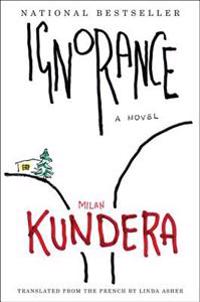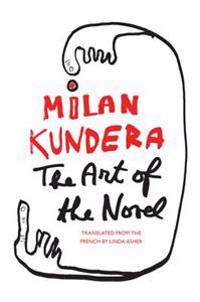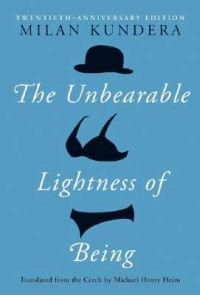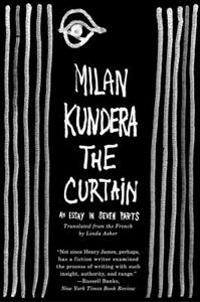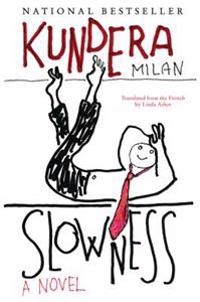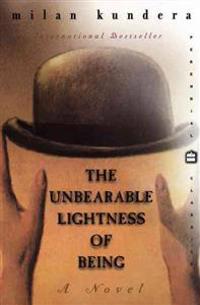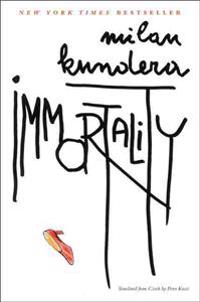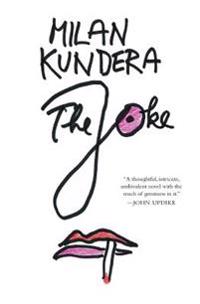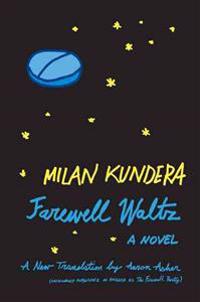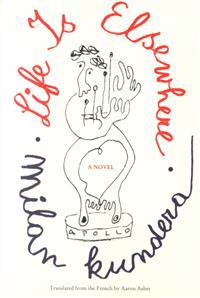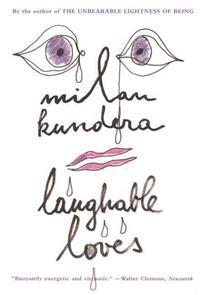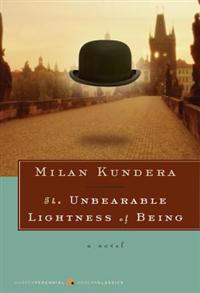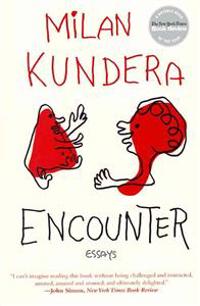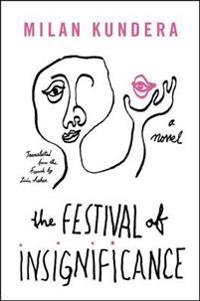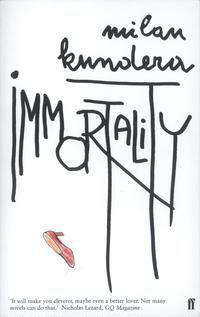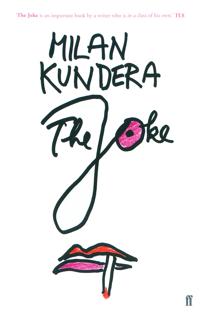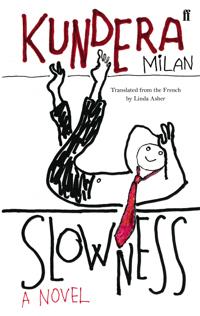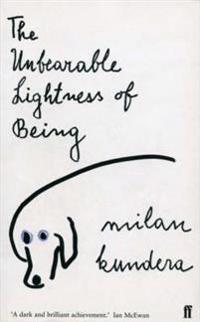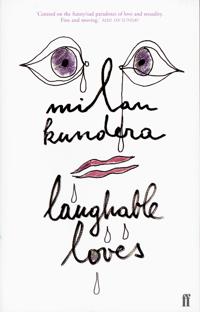Ignorance (Häftad)
avMilan Kundera
ISBN: 9780060002107 - UTGIVEN: 200309A man and women enjoy a strange synchronicity when they meet upone returning to their homeland after two decades of exile and try to resume a relationship long in stasis. Reader's Guide available. Reprint. 60,000 first printing.[...]
The Art of the Novel (Häftad)
avMilan Kundera
ISBN: 9780060093747 - UTGIVEN: 200304Kundera brilliantly examines the work of such important and diverse figures as Rabelais, Cervantes, Sterne, Diderot, Flaubert, Tolstoy, and Musil. He is especially penetrating on Hermann Broch, and his exploration of the world of Kafka's novels vividly reveals the comic terror of Kafka's bureaucrati[...]
The Unbearable Lightness of Being: Twentieth Anniversary Edition (Inbunden)
avMilan Kundera
ISBN: 9780060597184 - UTGIVEN: 200405When The Unbearable Lightness of Being was first published in English, it was hailed as "a work of the boldest mastery, originality, and richness" by critic Elizabeth Hardwick and named one of the best books of 1984 by the New York Times Book Review. It went on to win the Los Angeles Times Book Priz[...]
The Curtain: An Essay in Seven Parts (Häftad)
avMilan Kundera
ISBN: 9780060841959 - UTGIVEN: 2007-12Traces the author's personal view of the history and significance of the novel in western civilization, arguing that a novel's development crosses international and language boundaries while serving to reveal previously unknown aspects of a reader's existence. By the author of The Art of the Novel. [...]
Slowness (Häftad)
avMilan Kundera
ISBN: 9780060928414 - UTGIVEN: 199704Milan Kundera's lightest novel, a divertimento, an opera buffa, Slowness is also the first of this author's fictional works to have been written in French.Disconcerted and enchanted, the reader follows the narrator of Slowness through a midsummer's night in which two tales of seduction, separated by[...]
Identity (Häftad)
avMilan Kundera
ISBN: 9780060930318 - UTGIVEN: 1999-04Sometimes--perhaps only for an instant--we fail to recognize a companion; for a moment their identity ceases to exist, and thus we come to doubt our own. The effect is at its most acute in a couple, where our existence is given meaning by our perception of a lover, and theirs of us. With his astonis[...]
The Unbearable Lightness of Being (Häftad)
avMilan Kundera
ISBN: 9780060932138 - UTGIVEN: 200507A young woman in love with a man torn between his love for her and his incorrigible womanizing; one of his mistresses and her humbly faithful lover--these are the two couples whose story is told in this masterful novel. In a world in which lives are shaped by irrevocable choices and by fortuitous ev[...]
Immortality (Häftad)
avMilan Kundera
ISBN: 9780060932381 - UTGIVEN: 199910Milan Kundera's sixth novel springs from a casual gesture of a woman to her swimming instructor, a gesture that creates a character in the mind of a writer named Kundera. Like Flaubert's Emma or Tolstoy's Anna, Kundera's Agnes becomes an object of fascination, of indefinable longing. From that chara[...]
The Joke (Häftad)
avMilan Kundera
ISBN: 9780060995058 - UTGIVEN: 190001All too often, this brilliant novel of thwarted love and revenge miscarried has been read for its political implications. Now, a quarter century after The Joke was first published and several years after the collapse of the Soviet-imposed Czechoslovak regime, it becomes easier to put such implicatio[...]
Farewell Waltz (Häftad)
avMilan Kundera
ISBN: 9780060997007 - UTGIVEN: 1998-04In this dark farce of a novel, set in an old-fashioned Central European spa town, eight characters are swept up in an accelerating dance: a pretty nurse and her repairman boyfriend; an oddball gynecologist; a rich American (at once saint and Don Juan); a popular trumpeter and his beautiful, obsessiv[...]
Life Is Elsewhere (Häftad)
avMilan Kundera
ISBN: 9780060997021 - UTGIVEN: 200007The author initially intended to call this novel The Lyrical Age. The lyrical age, according to Kundera, is youth, and this novel, above all, is an epic of adolescence; an ironic epic that tenderly erodes sacrosanct values: childhood, motherhood, revolution, and even poetry. Jaromil is in fact a poe[...]
Laughable Loves (Häftad)
avMilan Kundera
ISBN: 9780060997038 - UTGIVEN: 199908Milan Kundera is a master of graceful illusion and illuminating surprise. In one of these stories a young man and his girlfriend pretend that she is a stranger he picked up on the road--only to become strangers to each other in reality as their game proceeds. In another a teacher fakes piety in orde[...]
The Unbearable Lightness of Being (Häftad)
avMilan Kundera
ISBN: 9780061148521 - UTGIVEN: 200910A young woman is in love with a successful surgeon, a man torn between his love for her and his incorrigible womanizing. His mistress, a free-spirited artist, lives her life as a series of betrayals--while her other lover, earnest, faithful, and good, stands to lose everything because of his noble q[...]
Encounter (Häftad)
avMilan Kundera
ISBN: 9780061894435 - UTGIVEN: 201110Milan Kundera's brilliant new collection of essays is a passionate defense of art in an era that, he argues, no longer values art or beauty. With the same dazzling mix of emotion and ideas that characterizes his bestselling novels, the internationally acclaimed author revisits the artists whose work[...]
The Festival of Insignificance (Inbunden)
avMilan Kundera
ISBN: 9780062356895 - UTGIVEN: 2015-06Casting light on the most serious of problems and at the same time saying not one serious sentence; being fascinated by the reality of the contemporary world and at the same time completely avoiding realism that's The Festival of Insignificance. Readers who know Kundera's earlier books know that the[...]
Immortality (Häftad)
avMilan Kundera
ISBN: 9780571144563 - UTGIVEN: 199801A novel, divided into seven parts and exploring immortality. This is the author's seventh novel. His previous works include "The Joke", "The Book of Laughter and Forgetting" and "The Unbearable Lightness of Being". He has written one play, "Jacques and his Master".[...]
Joke (Häftad)
avMilan Kundera
ISBN: 9780571166930 - UTGIVEN: 199801This is the first novel by the author of "Immortality", which won "The Independent" Award for Foreign Fiction in 1991. Milan Kundera is also the author of "The Book of Laughter and Fogetting".[...]
Book of Laughter and Forgetting (Häftad)
avMilan Kundera
ISBN: 9780571174379 - UTGIVEN: 199605Kundera whirls through comedy and tragedy towards his central question: how does a person, any person, live today? In constructing his answer, he writes of politics, sex, literature, modern man's alienation - and of their antidotes: laughter and forgetting.[...]
Slowness (Häftad)
avMilan Kundera
ISBN: 9780571179435 - UTGIVEN: 1997-01Readers are taken through a midsummer's night in which two tales of seduction, separated by more than 200 years, interweave and oscillate between the sublime and the ridiculous. They provide merely a narrative framework for Kundera's novel, within which is condensed existential analysis.[...]
Farewell Waltz (Häftad)
avMilan Kundera
ISBN: 9780571194711 - UTGIVEN: 1998-08Klima, a celebrated jazz trumpeter, receives a phone call announcing that a young nurse with whom he spent a brief night at a fertility spa is pregnant. She has decided he is the father and so begins a comedy which, during five madcap days, unfolds with ever-increasing speed.[...]
Identity (Pocket)
avMilan Kundera
ISBN: 9780571196357 - UTGIVEN: 1998-01Boken er skrevet som en fuge, og består av 51 små kapitler. Bokens tema er de store spørsmål: Er det mulig å kjenne andre mennesker? Og er det mulig å kjenne seg selv? Romanens mannlige hovedperson spør seg selv: Hvem er dette mennesket jeg har tilbrakt livet sammen med i så mange år? Kunde[...]
Life is Elsewhere (Häftad)
avMilan Kundera
ISBN: 9780571197774 - UTGIVEN: 2000-09A budding poet and his adoring mother are the central characters of this early novel.
The Unbearable Lightness of Being (Pocket)
avMilan Kundera
ISBN: 9780571200832 - UTGIVEN: 199904A novel of irreconcilable loves and infidelities, which embraces all aspects of human existence, and addresses the nature of twentieth-century 'Being'.[...]
Laughable Loves (Häftad)
avMilan Kundera
ISBN: 9780571206926 - UTGIVEN: 2000-08This collection contains stories about the sport of love - Don Juanism, ageing, male and female power and seductions undertaken for all kinds of intriguing motives. Milan Kundera is author of "The Unbearable Lightness of Being" and "The Book of Laughter and Forgetting".[...]

